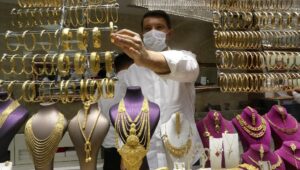A strict quota on gold imports aimed at reducing Turkey’s trade deficit has triggered a surge in gold smuggling and severely impacted the jewelry industry, leading to layoffs and workshop closures, according to reports in the Turkish media.
Industry representatives warn of a deepening crisis as Turkey’s gold import quota, introduced in August 2023 to address the trade deficit, has inadvertently fueled widespread gold smuggling and crippled the country’s jewelry sector due to escalating price disparities between Turkish and international gold markets, disrupting local demand and exports.
The gold import quota limits Turkey to 12 tons per month, 1.5 times the previous monthly average.
Nevertheless, because there was recently a surge in gold imports, the limit based on the long-term average meant that Turks got less unprocessed gold than they demanded, causing the price of gold to soar by as much as $5,000 more per kilogram compared to international markets.
The Ekonomim news website, citing the İstanbul Chamber of Jewelers, reports that this gap has incentivized smuggling, estimated at 50 tons annually, while burdening manufacturers seeking raw material through legal means with higher costs.
Ministry of Trade data show a sharp increase in intercepted smuggled gold, with seizures valued at 2.5 billion Turkish lira (approximately $72 million) between January and October 2024, surpassing the total amount intercepted over the previous decade. However, sector representatives say this accounts for less than 10 percent of the total smuggled gold.

Adem ALTAN / AFP
Smuggling scandals
The issue gained political prominence after three Nationalist Movement Party (MHP) lawmakers resigned in November following allegations of involvement in smuggling operations. The lawmakers allegedly exploited their privileges to import gold from Dubai at reduced prices in exchange for commissions.
Journalist Fatih Altay reported that President Recep Tayyip Erdoğan confronted MHP leader Devlet Bahçeli with video evidence of the MPs’ involvement during a meeting on November 14. Despite their resignations, no investigations have been launched into the accused lawmakers.
In a separate case, the BirGün daily revealed that Yunus Emre Morkoç, an aide to former deputy customs and trade minister Fatih Metin, was arrested in September at İstanbul Airport’s VIP lounge with 60 kilograms of illegal gold valued at $5 million. While Morkoç was taken into custody, no action was taken against Metin, who denied any knowledge of the smuggling attempt.
The Turkish government put an import quota on Gold and restricted imports, Gold has now a 10% premium and smuggling of Gold has become vivid as Turkish retail has a traditional big demand for Gold. https://t.co/uxpo2lTjiS
— A. Özbek (@Ahmetzbek) November 24, 2024
Jewelry sector on the brink
The jewelry industry, which depends heavily on gold imports, is reeling from the consequences of the quota policy. Exports fell by 24.2 percent in October, and many workshops have shut down temporarily for the first time in years. Speaking to the Dünya news website, Burak Yakın, president of the Jewelry Exporters’ Association (MİB), warned that 250,000 jobs are at risk as the sector grapples with dwindling orders and rising costs.
“The market has shrunk by 30 percent. Businesses are closing, and layoffs have begun. We are on the verge of losing a century-old industry,” Yakın was quoted by Dünya as saying.
Speaking to Ekonomim, Mustafa Atayık, president of the İstanbul Chamber of Jewelers, emphasized that the quota has forced producers to buy gold at prices $3,000–$4,000 higher per kilogram than global rates. He added that smuggled gold, often of low quality, increases costs for manufacturers, as poorly refined gold bars must be recast, resulting in significant production losses.
Calls for reform
Industry leaders have called for urgent reforms, including the removal or relaxation of the gold import quota and the introduction of a gold-based accounting system to streamline operations and address allegations of tax evasion. Atayık also urged the government to grant quota rights to workshops with verified capacity and to include jewelers in the management of Borsa İstanbul’s Precious Metals Market.
Without these changes, the industry risks further job losses, declining exports and the relocation of manufacturing bases abroad. Many local producers are already partnering with firms in Dubai, Egypt and Iraq to move their operations overseas, further eroding Turkey’s competitive edge in the jewelry market.
Rising global gold prices add pressure
The crisis is compounded by geopolitical tensions and rising global gold prices. According to Mehmet Ali Yıldırımtürk, a gold and currency market expert, the price gap between Turkey and international markets has rebounded to $3,500 per kilogram, after briefly narrowing during the summer.
“The high prices, combined with limited monthly imports of 12 tons, have led to layoffs in workshops. Investment gold has seen a slight recovery, but demand for jewelry remains low,” Yıldırımtürk told the Habertime news website.
The Turkish government introduced the quota to stabilize the trade deficit, but critics argue that the policy has backfired, creating a lucrative black market and destabilizing one of Turkey’s most valuable industries. Speaking to Dünya, Yakın warned, “We are losing not only quality but also production capacity. The race is over unless the quota is lifted.”


